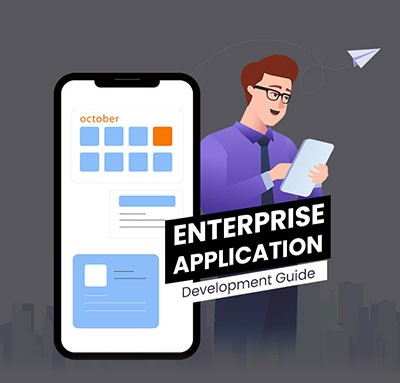
About us
Our Services
Our Expertise
Our Experience
Follow us
Why e2logy?
- We strive to provide superior customer service and ensure that every client is completely satisfied with our work.
- Our engineers are trustworthy, dedicated, and experienced and will go the extra mile to solve your IT issues.
- We are committed to delivering outstanding, cutting-edge IT solutions that add real value that goes beyond what is expected.

Enterprise Application Development Guide

We are living in an age of connected customers for modern enterprises. Streams of real-time data generated by an enterprise’s connections with customers and employees offer incredible value in today’s business world. Enterprise IT, the staff who builds apps for these companies, will have to change the way they develop apps.
Do you know what we are talking about, or would you like to learn more about how to develop enterprise mobile applications?
I am sure you will find this guide to be beneficial.
What is Enterprise Application Development?
The term enterprise apps refer to apps tailored to the specific requirements of major companies and businesses. Enterprise apps can run on multiple systems, such as a web server, and can be shared over networks.
During the enterprise application development process, we aim to create robust, user-friendly applications that utilize cutting-edge techniques and adhere to the most stringent security standards. Additionally, reducing operating expenses, automating processes, improving departmental consistency, and enhancing collaboration, enterprise applications serve as a means of lowering operating expenses, automating processes, and making business transactions more efficient.
The entire business can experience improved operations as a result of the benefit-specification principle, and generate greater profits and income.
Types of Enterprise Mobile Applications
Several types of enterprise mobile applications are available to enterprises today, as discussed in the following sections.
1. Employee Level
Applications tailored specifically to employees’ positions and tasks are employee-level mobile applications. They are primarily designed for internal use, which limits their functionality. The employee app helps executives stay updated on the progress of various projects and keep track of employee workload.
2. Department Level
Apps designed for departments are designed to help specific departments, such as finance, Human Resources, sales, or marketing, manage their internal workflows. These apps incorporate department-level features and are used to manage departmental productivity in an enterprise, as well as monitor the productivity of subordinates.
3. Enterprise Level
Enterprise apps connect different departments within an enterprise to create an integrated marketing platform. Communication between employees from different departments is made possible through this system. As well as providing access to different databases and information, it is also used for storing important information.
Each type of mobile enterprise application has its objective, as you have seen. Creating an employee-level app type may allow you to develop an enterprise app that is most suitable for your requirements. So, let’s take a look at,
How Can Enterprise Application Development Benefit Your Business?
Automated systems can increase productivity, which is why enterprise app development is popular. Apps have many advantages, such as accessibility, security, integration, and allowing users to use them from multiple devices.
But,
Are there any benefits to your business from enterprise app development?
Let’s see.
- Enhances the management of data
- Reduction of paperwork and human error
- Improves supply chain
- Supports clients/customers better
- Maintains a smooth flow of information
- Operational efficiency is improved
- Reports are easy to generate
Through automation and streamlining of business processes, enterprise mobile app development helps businesses achieve better results.
Moving on, let’s talk about,
The key functionalities you should consider when developing enterprise applications!
You must incorporate these features into your custom enterprise application:
1. Storage
Each day, businesses generate tremendous amounts of data. The task of simply storing and interpreting all of that data is challenging sufficient on its own. Data are mostly unstructured, which makes it difficult to search and analyze documents, images, and other information. You can store your data by using cloud computing and cloud storage. Both solutions are simple and effective.
2. Compatibility
Application development across platforms, regardless of platform, requires cross-platform customization. It will be useless to the majority of users if your workforce cannot access the app on multiple platforms and devices.
3. Scalability
Scalability is one of the most important factors in determining a product’s quality. Scalable products tend to degrade from there and eventually disappear from the market. Scalability is the capacity of any software, operation, feature, or other component to grow and improve over time.
4. Communication
Having a full-featured chat service built into your app would be a wise decision. Employees can communicate instantly with each other using an enterprise app’s chat feature, regardless of their location.
5. Reporting & Analytics
A well-designed enterprise application includes an analytical component. By integrating analytics into your app, you can get a better understanding of user behavior patterns and how it functions as a whole. All of this information can also be tracked, so you can enhance your applications to increase conversions and involvement.
6. Push Notifications
Using the push notification function, a task or notice’s priority can be shown simply. You would genuinely meet all of your requirements with the push notification, as it would make your application more valuable and relevant. With the help of push notifications, neither you nor your employees will be left out of important notifications.
As well as these, you can add other functionalities according to your requirements.
Moving forward, let us discuss,
Enterprise Mobile Application Development Process
Developing enterprise mobile apps involves the following phases:
1. Outline Your Ideas
A good strategy for application development should be defined based on the goals and purposes of the project. Outline the major purpose of the application and the major requirements and pain points of the target audience. A developer would be better equipped to understand the objectives and goals of enterprise mobile application development by obtaining such information.
2. Choosing the Platform
Taking this into account, now you need to choose which operating system your mobile app will run on. When selecting an appropriate application development platform, you should assess and consider the perspective of the users. Your stakeholders may prefer iOS or Android depending on which platform they use. To target more users, the majority of businesses decide to build cross-platform applications.
3. Designing a prototype
The core functionality of your enterprise mobile application must be considered once your business goals and platform have been determined. A prototype will be developed of the upcoming application based on the functionality required by the client. Thus, you’ll be able to think about the features and aesthetics of your mobile application better. Your future mobile application can be customized and tested during this development phase.
4. Hire a developer
When you want to build your enterprise mobile application smoothly, you should hire an application developer. The development can be done in-house or outsourced to an experienced developer. It is advantageous to outsource, among other things, to have the best necessary solutions for any development problems that arise.
This phase of application development requires collaboration between developers and UI/UX designers. To develop a user-friendly and intuitive interface design for the application, a UX designer will focus on the functional aspect of the application while a UI designer will focus on the visual appeal. An entire mobile application will be crafted by our programmers.
5. Application Testing
The application must be tested from both the inside and outside in order to be finalized. Any bug-containing parts of the application must be tested thoroughly. The application can also be subjected to automated testing, ensuring a perfect examination as well as reliable results. As soon as your enterprise mobile application is launched, ask for feedback to determine if it requires any further improvement.
Benefits of Enterprise Mobile Application
- Departments within an organization can form a more effective alliance.
- Additionally, incorporating desired payment features, the application notifies you when third-party payments are due, thereby effectively managing business payments and transactions.
- Through quick access to enterprise information, your employees will provide excellent customer service, solve issues more efficiently, and respond to issues faster.
- You can work and access information while on the go with enterprise mobile applications.
- Paperless processes replace the old-fashioned approach based on paper and provide more efficient and secure methods.
- All employees benefit from mobile applications that keep them connected to their subordinates, making it easier for them to build healthy and happy relationships.
- It keeps statistics automatically synchronized and stored in the background and allows you to work offline and access data.
- Mobile applications automate complex business processes and enable real-time collaboration between employees. By enabling employees to focus on other important tasks, employee productivity is increased.
- Supply chain processes such as warehouse management and transportation can be controlled more efficiently with an enterprise application.
Closing Words
The success of an enterprise is enhanced by enterprise mobile applications that incorporate quality features and automation techniques. Optimizing an organization’s profitability and operational efficiency is a core goal of the process. Despite this, enterprise mobile app development is a time-consuming process that relies on several variables, such as the complexity of the app, the software’s functionality, and the developer’s experience.













